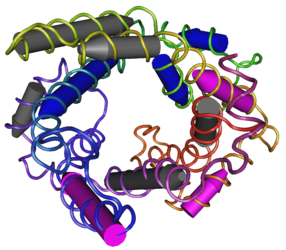Kimberly Jimenez: UCP2
From Proteopedia
Contents |
Uncoupling Protein 2 (UCP2) in Diabetes
Figure 1: Uncoupling Protein 2
This is a default text for your page Kimberly Jimenez: UCP2. Click above on edit this page to modify. Be careful with the < and > signs. You may include any references to papers as in: the use of JSmol in Proteopedia [1] or to the article describing Jmol [2] to the rescue.
Disease
Mitochondria are found in the every cell in the human body and it acts as the "power house" of the cell. The mitochondria is called the "power house" because it converts the food consumtion and oxygen to energy to power the body.
A mitochondrial disorder is caused by the mutation of mitochondrial DNA (mtDNA). This disorder is genetic transmitted from a parent and can be seen from birth or at an older age. These disorders are chronic disorders. Some of this disorders can be seen in figure 1.
Function
Relevance
Structural highlights
This is a sample scene created with SAT to by Group, and another to make of the protein. You can make your own scenes on SAT starting from scratch or loading and editing one of these sample scenes.
</StructureSection>
References
- ↑ Hanson, R. M., Prilusky, J., Renjian, Z., Nakane, T. and Sussman, J. L. (2013), JSmol and the Next-Generation Web-Based Representation of 3D Molecular Structure as Applied to Proteopedia. Isr. J. Chem., 53:207-216. doi:http://dx.doi.org/10.1002/ijch.201300024
- ↑ Herraez A. Biomolecules in the computer: Jmol to the rescue. Biochem Mol Biol Educ. 2006 Jul;34(4):255-61. doi: 10.1002/bmb.2006.494034042644. PMID:21638687 doi:10.1002/bmb.2006.494034042644

